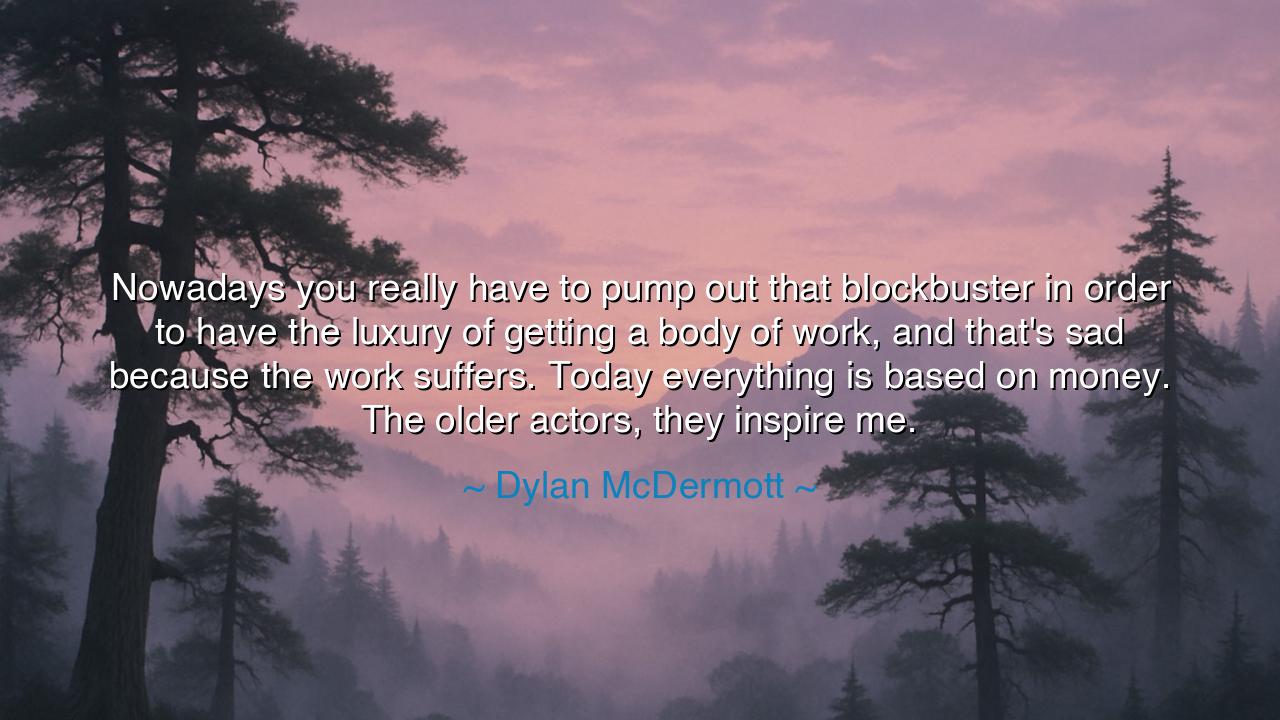
Nowadays you really have to pump out that blockbuster in order to
Nowadays you really have to pump out that blockbuster in order to have the luxury of getting a body of work, and that's sad because the work suffers. Today everything is based on money. The older actors, they inspire me.






Hear the lament of Dylan McDermott, a voice both sorrowful and reverent: “Nowadays you really have to pump out that blockbuster in order to have the luxury of getting a body of work, and that’s sad because the work suffers. Today everything is based on money. The older actors, they inspire me.” In these words, he speaks not only of film, but of art itself—how it bends beneath the weight of commerce, how the sacred pursuit of truth is often sacrificed for profit, and how wisdom endures in those who refuse to compromise their craft.
The blockbuster, that towering spectacle designed to dazzle and to earn, has become the coin of survival in cinema. To create quietly, thoughtfully, with patience and depth, has grown rare in a marketplace where each story is judged not by its soul but by its gross. McDermott grieves this truth, for he knows that when the artist must chase the dollar rather than the vision, the work suffers. The flame of creativity is dimmed, and the audience, though entertained, is left hungry for nourishment of the spirit.
The ancients, too, knew this tension between art and commerce. In Rome, the great amphitheaters were filled with spectacles of blood and grandeur, designed to please the masses and secure the favor of emperors. Yet the poets, the philosophers, the dramatists who dared to probe the depths of the soul were often pushed aside. Still, their words endured when the gladiators’ roars faded. The wisdom of Sophocles, Seneca, and Cicero outlived the fleeting glory of the games, proving that art born of truth, not profit, carries eternal weight.
History gives us further examples. Vincent van Gogh died penniless, his canvases unsold, his genius unrecognized by the market of his time. Yet his works now are priceless, not because of commerce but because of their authenticity. In the same way, McDermott honors the older actors—those who devoted themselves to the craft, not for wealth but for truth. They stand as reminders that art’s highest calling is not to sell, but to endure, to speak across time, to awaken the hearts of generations yet unborn.
The sadness McDermott names is not despair, but warning. For if artists surrender wholly to profit, art itself will wither into emptiness. The explosion of the blockbuster may dazzle for a moment, but it will not feed the soul of humanity. Only the labor of love, the devotion to craft, will last. Thus, the older actors inspire him—not because they are relics, but because they show that integrity in art can survive even in a world consumed by commerce.
The lesson for us is clear: do not measure your worth, nor your labor, solely by its financial reward. Create, work, and live in pursuit of what is true, what is excellent, what endures. If the world does not at once reward you, take heart, for history itself is the final judge, and it will honor what is authentic. Let the older actors, the artists of integrity, be your guides. Follow their example by valuing the work itself over the applause or the gold it brings.
So let McDermott’s words stand as a teaching: the age may chase money, but the soul must chase meaning. The blockbuster may rule today, but true art will outlive it. Therefore, live as the ancients taught: create not for profit but for truth, labor not for fleeting favor but for eternal value. For only then will your work become more than a commodity—it will become a testament, a light carried beyond your time, to inspire those who come after you.






AAdministratorAdministrator
Welcome, honored guests. Please leave a comment, we will respond soon